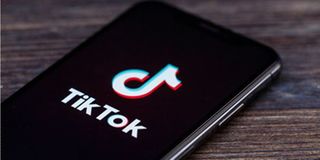TikTok strikes deal with African Union amid increased scrutiny over data use

The new move comes as some countries, including Kenya, are considering a partial ban on the platform.
Chinese-owned social media platform TikTok has announced a new campaign to educate Africans about online safety, amid increased scrutiny from countries on the continent.
The new move comes as some countries, including Kenya, are considering a partial ban on the platform.
The new campaign will be rolled out across the continent on the digital platform and on the ground, in partnership with the African Union Commission's Women, Gender and Youth Directorate (WGYD), and aims to "raise awareness of online safety among youth as well as parents, teachers and guardians in Africa".
Launched on the sidelines of the TikTok Safer Internet Summit in Accra, Ghana last week, the new campaign comes at a time when TikTok is facing existential challenges in Africa and beyond, with many questioning the security of user information on the platform.
"This partnership couldn't come at a better time. We all know how much our lives revolve around the internet these days, and it's vital that we stay safe online," said Fortune Mgwili-Sibanda, TikTok's Director of Government Relations for Sub-Saharan Africa.
"While access to the internet can help children and young people stay connected, improve their digital literacy and diversify their livelihoods, it is critical that they are provided with a safe environment to reap the benefits of digital platforms," added Prudence Ngwenya, Director of WGYD at AUC.
According to TikTok, the initiative will involve availing educative videos on digital and internet safety on the platform, as well as hashtag challenges and providing ‘safety toolkits’ to teachers and guardians.
These new efforts to boost online safety of TikTok users, may, however, not ease the scrutiny it is already facing across Africa and beyond, with an imminent ban in the United States, for instance, if it doesn’t divest its American arm.
In Kenya, Interior Cabinet Secretary Kithure Kindiki last week told lawmakers that the government is considering barring civil servants from using TikTok, as part of the measures to ensure security of sensitive information.
“TikTok platform has been used by criminals to spread malicious propaganda, steal popular accounts through identity theft and impersonation, conduct fraud by duping Kenyans into fake forex trade and fake job recruitment and distribute sexual content and images through its live feature,” Prof Kindiki told legislators last week.
Kenya would not be the first country to bar state officers from using the popular social media platform. The European Union, Belgium, Canada, France, and the United Kingdom have all banned their senior staff from using TikTok on their phones.
Somalia, in August last year, banned TikTok, citing the harm it had caused to social morals and cultural values in the horn of Africa country, coming days after Senegal also banned the platform, citing security risks.
Activists in Kenya and Uganda, have also called for a ban on TikTok on their respective countries, pointing to the ‘negative’ impacts of the global platform on the countries’ youth.
With about 1.6 billion users globally, TikTok is currently the fifth most popular social media platform, coming after Facebook, YouTube, WhatsApp and Instagram, which have over 2 billion users each, according to digital monitoring firm Meltwater.
In Kenya, data from the Communications Authority of Kenya (CA) shows that TikTok is the fourth most popular platform, used by about 17 percent of Kenyans currently, coming after Facebook, WhatsApp, and YouTube.




